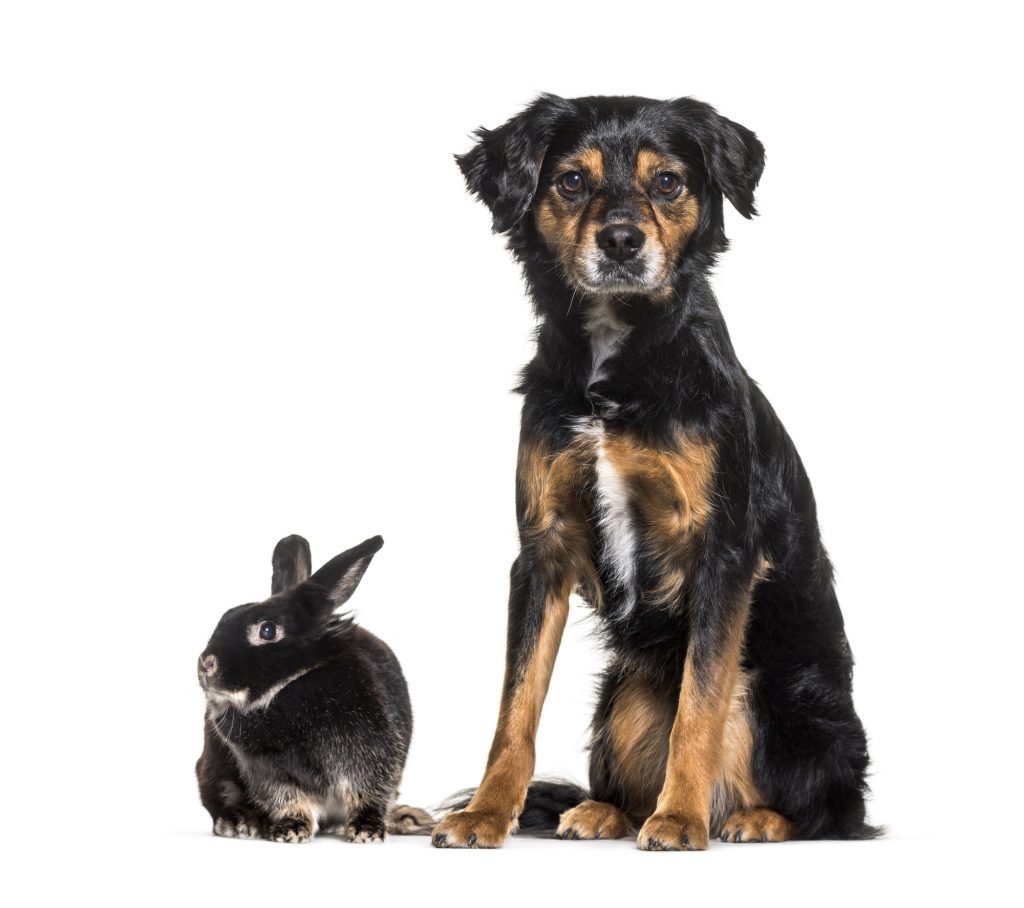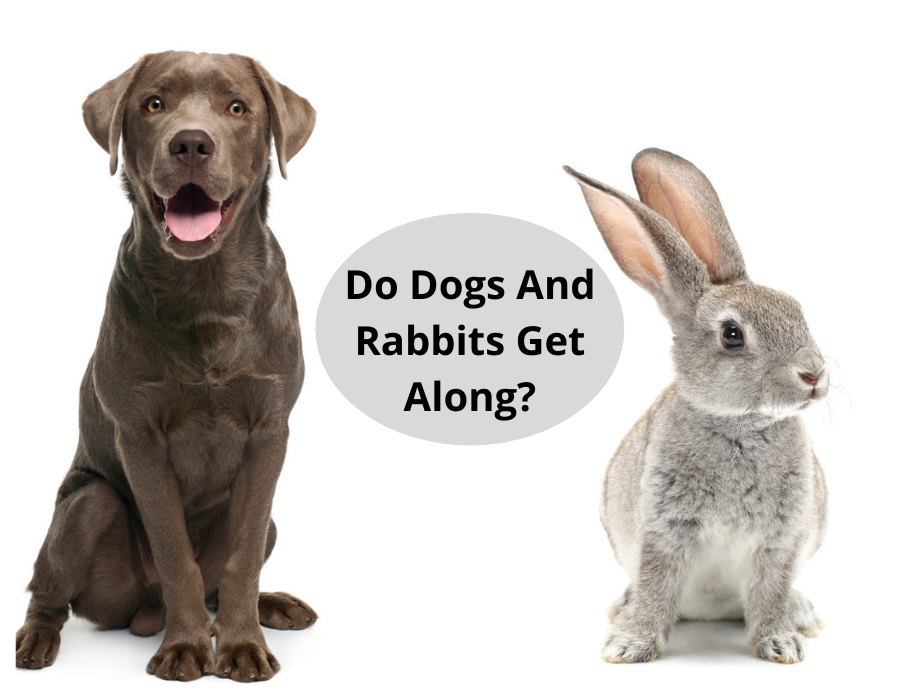Safe and calm cohabitation between pets of different species can be tricky waters to navigate, especially when the two species fall into the category of prey and natural predator. Such is the case with dogs and rabbits. However, harmonious cohabitation between pets depends largely on each individual pet and the owner, so there are ways to make it possible.
If you are wondering do dogs and rabbits get along, this article will dive into that question and provide you tips for helping them cohabitate peacefully.
So, Do Dogs And Rabbits Get Along?
Dogs and rabbits can get along with a good introduction, proper ownership, and well-matched personalities. Some dog breeds have high prey drives, so cohabitation with rabbits is harder to manage. However, a dog’s personality can defy breed characteristics to make them more or less suitable rabbit companions.
Reasons Why Dogs And Rabbits May Not Get Along
Size Differences
It may be tempting to say that smaller dogs will get along with rabbits better because they are more similar in size to rabbits. To a certain extent, this could be true.
However, this is only taking size into account. There are, of course, other factors that will exert a significant influence.
For example, some small dogs were bred specifically for rodent hunting, and their small size evolved to help them follow their prey into the small spaces. One such breed is the Teddy Roosevelt Terrier. This obviously could pose some problems.
Large dogs may look more imposing to your rabbit, who is going to respond instinctively to the size of this potential predator with caution, if not fear, without taking the time to find out if the dog is friendly. You may be able to convince the rabbit that their canine companion is sweet-natured, but it could take time and effort.
Furthermore, your larger dog can potentially hurt your rabbit by accident, for example, when playing. Your rabbit will then learn to avoid them for fear of injury. Pairing a miniature rabbit breed with a large or giant breed of dog may not be the best choice.
Pairing a toy breed dog with a giant rabbit breed can have the same consequences as a big dog and a small rabbit, as the larger rabbit could injure the small dog.
Different Temperaments
Having a nervous rabbit will make them more likely to run at the slightest provocation. Even the sweetest dogs with the lowest prey-drive will take notice of a darting figure and potentially give chase. So, a confident rabbit is more likely to adapt to having a dog companion than a nervy one.
Additionally, a neurotic or reactive dog may not have the most stable temperament. As a result, they can be more unpredictable and may be triggered to chase or snap at your rabbit if they are stressed out, even if they have lived harmoniously with the rabbit for months or years.

Dogs who attach strongly to their humans, the Velcro dogs, may get upset at any attention you pay to the rabbit and might take their jealousy out on the rabbit.
Alternatively, your dog may be possessive of you and respond aggressively whenever your rabbit approaches you. They might get along just fine together, but as soon as you try to interact with them both, things can get hairy.
Rabbits are not immune to aggression. An aggressive rabbit who finds a sweet-natured dog an easy target can bully the dog or attack out of fear-borne aggression. This is not going to foster happy relations between the dog and rabbit. Furthermore, your dog may have enough one day and snap back, which can have potentially fatal consequences.
Different Ways Of Communication
As different species, lines of communication between dogs and rabbits can become crossed, leading to misunderstandings.
For example, dogs bark when they get excited. Your dog may bark at your rabbit to tell it that it’s time to play, but your rabbit will only be frightened by the noise.
Another example is when your bunny thumps its foot to indicate fear. Your dog doesn’t know that this is what the action means, and they may be intrigued by the sound and come closer to investigate.
The Dog’s Personality
Personality is very difficult to predict, and it’s a bit of a gamble when trying to select a dog with a personality that will be fine with a rabbit. Personality is also so individual and unique to each dog.
Your dog may have all the hallmarks of a rabbit chaser, high prey-drive, reactive temperament, etc., yet they absolutely love your rabbit and wouldn’t harm it ever. In fact, they might act as the rabbit’s protector against other possible dangers.
Moreover, your dog may see your rabbit as part of the pack, but any other rabbit as prey.
However, your sweet-natured dog, who is best friends with the parrot or cat, may decide that they don’t like the look of the rabbit, so it can never be part of the family. This sounds silly but think about the different personalities that humans have. Dogs are just as diverse and unique.
Different Styles Of Play
Dogs and rabbits play differently, and this can lead to more cases of misunderstanding. Your rabbit will frolic, jump, and binky while playing. Their quick and darting movements may be too much for your already excited dog to resist.
If you’ve seen two dogs playing, you can imagine how rolling a bunny over or batting it with a paw can cause accidental injury to your delicate rabbit.
The Dog Has A High Prey-Drive
Some dog breeds are bred to hunt and hunt rats, mice, rabbits, and other small animals. The instinct to chase a darting rabbit can be so ingrained that no amount of training will stop the behavior entirely.
Quick Tips For Owning Both A Dog And A Rabbit
Train Your Dog
The ability to call your dog away from your rabbit or tell them ‘no’ and have them obey is critical to a happy relationship between your dog and rabbit. Training needs to be extensive enough that your dog will listen to you even when they are presented with an exciting situation.
You won’t just need to call your dog off if they are showing aggression towards your rabbit. Your dog may just be over-excited and rambunctious, and they will need to understand a cue to calm down or back-off.
Obedience training for your dog is also the key to a good introduction.
Properly Introduce Them
The introduction between a dog and a rabbit should always be done slowly. Start with your rabbit in their enclosure (door closed) and your dog on a leash. Encourage and reward any calm investigative behavior. Quickly correct any unwanted behaviors using your obedience-training commands.
Once they are both comfortable and calm with the on-leash and closed-cage interactions (this may take a few days or longer), then you can try to let your rabbit out of the cage. Keep your dog on its leash and make it sit before getting the rabbit out. Once again, commend and reward positive responses and correct negative behaviors.
When these interactions are occurring without the need for correction, you can try taking your dog off the leash. This step may be best to embark upon with an extra set of hands and eyes.
Keep the interaction sessions at each stage relatively short, especially at the start.
Don’t Leave Your Dog And Rabbit Together Unsupervised
Leaving a dog and rabbit alone together is the start of many tragic stories, and often the pets seemed to be getting along fine until the incident.
If you are present, you can make sure that play does not become too rough, and you can also intervene when you notice excitement levels are reaching a potentially dangerous point.
You might eventually reach the point where you are more comfortable with your dog’s and rabbit’s interactions but that doesn’t mean they should be unsupervised if your rabbit is out of the cage.
Give Them Their Own Spaces
Your rabbit should always be able to access a safe enclosure, and your dog should always be able to retreat to an area that is its own rabbit-free zone.
Even best friends need space, and not forcing your dog and rabbit to share every inch of the house and be together every moment of the day and night will make them much more likely to get along.
You should also feed them separately. Not only do they have different dietary requirements and should not be nibbling on each other’s dinners, but food is often a sensitive point for animals.
Even rabbits can become possession aggressive. You also don’t want to create an atmosphere of where either your dog or rabbit feels like they need to be territorial over their food.
List Of Dog Breeds That Should Get Along With Rabbits
As mentioned, some dog breeds have a very high prey-drive, and they won’t be able to resist chasing a darting rabbit. However, other dog breeds have a low prey-drive and may be better choices as companions for rabbits. These breeds include:
- Maltese
- Bichon Frisé
- Cavalier King Charles Spaniel
- Great Pyrenees
- Golden Retriever
- Old English Sheepdog
- Japanese Chin
Conclusion
Dogs and rabbits can definitely get along and cohabitate peacefully. However, you, as the owner, are very important in facilitating harmonious cohabitation between them. You can’t control everything, but there are a number of steps you can take to improve the chances that your two beloved pets will be safe and happy in your home.
These steps start with choosing a dog with a low prey-drive and training it to obey your commands of ‘stop’ and ‘leave it. Furthermore, you should introduce them properly and never leave them unsupervised to ensure both their safety long term.
Although many dogs can get along with small pets like rabbits, guinea pigs, and hamsters. You may want to consider getting another rabbit or small animal like a guinea pig for your rabbit’s companion if your don’t think your dog will be a good sibling for a bunny.

